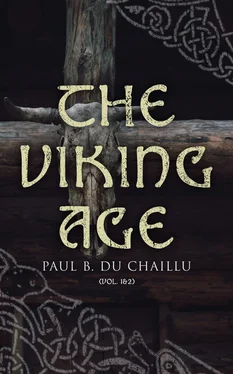The Notitia—Probable origin of the name England—Jutland—The language of the North and of England—Early Northern kings in England—Danes and Sueones—Mythical accounts of the settlements of England.
Britain being an island could only be settled or conquered by seafaring tribes, just in the same way as to-day distant lands can only be conquered by nations possessing ships. From the Roman writers we have the only knowledge we possess in regard to the tribes inhabiting the country to which they gave the vague name of Germania. From the Roman records we find that these tribes were not civilised and that they were not a seafaring people.
Unfortunately the Roman accounts we have of their conquest and occupation of Britain, of its population and inhabitants, are very meagre and unsatisfactory, and do not help us much to ascertain how the settlement in Britain by the people of the North began. Our lack of information is most probably due to the simple reason that the settlement, like all settlements of a new country, was a very gradual one, a few men coming over in the first instance for the purpose of trade either with Britons or Romans, or coming from the over-populated North to settle in a country which the paucity of archæological remains shows to have been thinly occupied. The Romans made no objection to these new settlers, who did not prove dangerous to their power on the island, but brought them commodities, such as furs, &c., from the North.
We find from the Roman records that the so-called Saxons had founded colonies or had settlements in Belgium and Gaul.
Another important fact we know from the records relating to Britain is that during the Roman occupation of the island the Saxons had settlements in the country; but how they came hither we are not told.
In the Notitia Dignitatum utriusque imperii , a sort of catalogue or “Army List,” compiled towards the latter end of the fourth century, occurs the expression, “Comes litoris Saxonici per Britannias”—Count of the Saxon Shore in Britain. Within this litus Saxonicum the following places are mentioned:—Othona, said to be “close by Hastings”; Dubris, said to be Dover; Rutupiæ, Richborough; Branodunum, Brancaster; Regulbium, Reculvers; Lemannis, West Hythe; Garianno, Yarmouth; Anderida, Pevensey; Portus Adurni, Shoreham or Brighton.
This shows that the so-called Saxons were settled in Britain before the Notitia was drawn up, and at a date very much earlier than has been assigned by some modern historians.
The hypothesis that the expression “litus Saxonicum” is derived from the enemy to whose ravages it was exposed seems improbable. Is it not much more probable that the “litus Saxonicum per Britannias” must mean the shore of the country settled, not attacked, by Saxons? The mere fact of their attacking the shore would not have given rise to the name applied to it had they not settled there, for I maintain that there is no instance in the whole of Roman literature of a country being named after the people who attacked it. If, on the other hand, the Saxons had landed and formed settlements on the British coasts, the origin of the name “Litus Saxonicum” is easily understood.
Some time after the Romans relinquished Britain we find that part of the island becomes known as England; and, to make the subject still more confusing, the people composing its chief population are called Saxons by the chroniclers and later historians, the name given to them by the Romans.
That the history of the people called Saxons was by no means certain is seen in the fact that Witikind, a monk of the tenth century, gives the following account of what was then considered to be their origin 17:—
“On this there are various opinions, some thinking that the Saxons had their origin from the Danes and Northmen; others, as I heard some one maintain when a young man, that they are derived from the Greeks, because they themselves used to say the Saxons were the remnant of the Macedonian army, which, having followed Alexander the Great, were by his premature death dispersed all over the world.”
As to how Britain came to be called England the different legends given by the monkish writers are contradictory.
The Skjöldunga Saga , which is often mentioned in other Sagas, and which contains a record down to the early kings of Denmark, is unfortunately lost: it would, no doubt, have thrown great light on the lives of early chiefs who settled in Britain; but from some fragments which are given in this work, and which are supposed to belong to it, we see that several Danish and Swedish kings claimed to have possessions in England long before the supposed coming of the Danes.
Some writers assert that the new settlers gave to their new home in Britain the name of the country which they had left, called Angeln , and which they claim to be situated in the southern part of Jutland; but besides the Angeln in Jutland there is in the Cattegat an Engelholm, which is geographically far more important, situated in the land known as the Vikin of the Sagas, a great Viking and warlike land, from which the name Viking may have been derived, filled with graves and antiquities of the iron age. There are also other Engeln in the present Sweden.
In the whole literature of the North such a name as Engeln is unknown; it may have been, perhaps, a local name.
In the Sagas the term England was applied to a portion only of Britain, the inhabitants of which were called Englar , Enskirmenn . Britain itself is called Bretland , and the people Bretar .
“Öngulsey (Angelsey) is one third of Bretland (Wales)” (Magnus Barefoot’s Saga, c. 11).
Another part of the country was called Nordimbraland .
It is an important fact that throughout the Saga literature describing the expeditions of the Northmen to England not a single instance is mentioned of their coming in contact with a people called Saxons , which shows that such a name in Britain was unknown to the people of the North. Nor is any part of England called Saxland.
To make the confusion greater than it is, some modern historians make the so-called Saxons, who were supposed to have come over with the mythical Hengist and others, a distinct race from the Northmen, who afterwards continued to land in the country.
In the Sagas we constantly find that the people of England are not only included among the Northern lands, but that the warriors of one country are helping the other. In several places we find, and from others we infer, that the language in both countries was very similar.
“All sayings in the Northern (norræn) tongue in which there is truth begin when the Tyrkir and the Asia-men settled in the North. For it is truly told that the tongue which we call Norræn came with them to the North, and it went through Saxland, Denmark, Sweden, Norway, and part of England” (Rimbegla, iii. c. i.).
“We are of one tongue, though one of the two, or in some respects both, are now much changed” (Prose Edda, ii.)
“Then ruled over England King Ethelred, son of Edgar (979). He was a good chief; he sat this winter in London. The tongue in England, as well as in Norway and Denmark, was then one, but it changed in England when William the Bastard won England. Thenceforth the tongue of Valland (France) was used in England, for he (William) was born there” (Gunnlaug Ormstunga’s Saga, c. 7).
That the language of the North should have taken a footing in a great part of England is due, no doubt, to the continuous flow of immigration, from the northern mother country, which entirely swamped the former native or British element.
The story given in the English or Irish chronicles of the appearance of the Danes, in A.D. 785, when their name is first mentioned, is as little trustworthy as that of the settlement of England, and bears the appearance of contradiction and confusion in regard to names of people and facts.
Читать дальше












